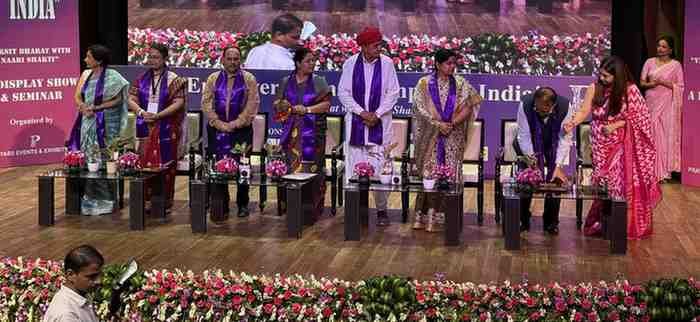New Delhi: In a vibrant celebration of women’s contribution to India’s progress, a national seminar titled “Empowered Women, Empowered India: A Step Towards a Developed Nation” was held on July 31, 2025, at the Dr. Ambedkar International Centre in New Delhi. The event served as a dynamic platform to promote women-led development and reinforce the central role of Nari Shakti in building a Viksit Bharat.
Organized under the guidance of Lok Sabha MP Shri Lumbaram Choudhary (Jalore-Sirohi, Rajasthan), the seminar was inaugurated with great enthusiasm by Members of Parliament Smt. Bijuli Kalita Medhi (Guwahati, Assam), Smt. Kamlesh Jangde (Chhattisgarh), and Shri Choudhary himself. The inaugural session set the tone for a day filled with inspiration, learning, and national pride.
The event concluded on a high note with the presence of Hon’ble Minister of State for Consumer Affairs, Food & Public Distribution, Smt. Nimuben Jayantibhai Bambhaniya, who attended as the Chief Guest. In her keynote address, she emphasized that a truly developed India is impossible without the full participation and empowerment of its women. “Half the sky belongs to women. A nation cannot rise without lifting its women,” she said, calling upon citizens to become active participants in the empowerment journey.
The seminar saw an impressive turnout, with thousands of participants from across the country, including students, educators, professionals, entrepreneurs, homemakers, scientists, and social workers. Their collective energy and engagement turned the event into more than just a conference—it became a movement.
A series of discussions, exhibitions, and inspirational storytelling sessions made the event both informative and moving. Stories of resilience, innovation, and leadership by women in diverse fields left a lasting impact on the audience. Several women leaders shared their journeys, offering not just inspiration but practical insights into overcoming systemic challenges.
Exhibition stalls set up by participating institutions presented technological innovations, community-driven initiatives, and government schemes aimed at promoting gender parity. From scientific research to agriculture, health care to education, the stalls demonstrated how women are actively shaping India’s developmental trajectory.
The participating organizations reflected the multidisciplinary nature of the event. Key institutions included the Bureau of Indian Standards (BIS), Pradhan Mantri Bhartiya Janaushadhi Pariyojana (PMBJP), Tamil Nadu Horticulture Development Agency (TANHODA), Central Council for Research in Siddha (CCRS), Indian Council of Agricultural Research (ICAR), Department of Atomic Energy (DAE), North Eastern Electric Power Corporation Limited (NEEPCO), National Institute of Open Schooling (NIOS), NCERT, Geological Survey of India (GSI), Indian Council of Medical Research (ICMR), and Protection of Plant Varieties and Farmers’ Rights Authority (PPVFRA).
These institutions showcased the growing involvement of women in areas such as science and technology, agriculture, energy, medicine, and education. Startups led by women entrepreneurs and community initiatives by grassroots workers added a holistic perspective to the empowerment narrative.
Corporate and institutional support for the event was also significant. Firefox served as the Gold Sponsor, while GAIL (India) Ltd., Shree Lal Mahal Group, and TANHODA participated as Silver Sponsors. Other key supporters included NEEPCO, Power Grid Corporation of India, LIC, Tea Board India, The New India Assurance Company, Sartaj Jan Sewa, and HPCL, who joined as Logo Sponsors.
The event not only highlighted women’s contributions but also urged participants to take the message beyond the auditorium walls. Attendees were encouraged to involve their communities, workplaces, and households in fostering an environment of equal opportunity and inclusion. The call to action was clear: empowerment must begin at the grassroots level and ripple outward to create systemic change.
Organizers emphasized that the seminar was not an end in itself but part of a broader vision—positioning women at the center of India’s development narrative. From policy advocacy to everyday practices, they reiterated the need for collective responsibility in making gender equality a lived reality.
As India moves steadily toward its goal of becoming a developed nation, the event served as a timely reminder that Nari Shakti is not just a slogan but the cornerstone of sustainable, inclusive growth. The overwhelming response and emotional engagement of the participants underscored the public’s belief in the transformative power of empowered women.
In essence, the seminar stood as a powerful reaffirmation: empowering women is not a side initiative—it is the heartbeat of India’s progress.








